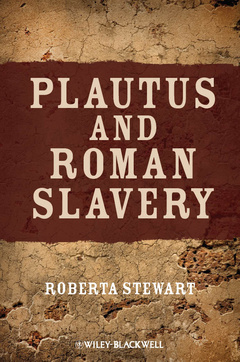Plautus and Roman Slavery
Auteur : Stewart Roberta

Plautus? comedies could be our most reliable source for reconstructing the lives of slaves in ancient Rome. By reading literature alongside the historical record, we can conjure a thickly contextualized picture of slavery in the late third and early second centuries bce, the earliest period for which we have such evidence.
The book discusses how slaves were captured and sold; their treatment by the master and the community; the growth of the conception of the slave as ?other than human,? and as chattel; and the problem of freedom for both slaves and society.
Introduction 1
1 Human Property 21
2 Enslavement, or “Seasoning” Slaves 48
3 Violence, Private and Communal 80
4 Release from Slavery 117
5 The Problem of Action 156
Conclusion 190
Bibliography 193
Index 215
Date de parution : 05-2012
Ouvrage de 240 p.
16x23.9 cm
Thème de Plautus and Roman Slavery :
Mots-clés :
Masters; slaves; slave society; world slavery; comparative slavery; Plautus' comedies; Moses Finley



